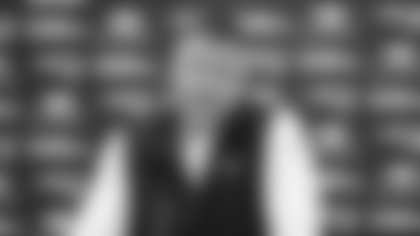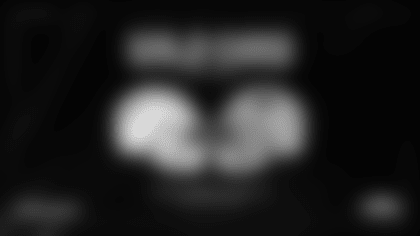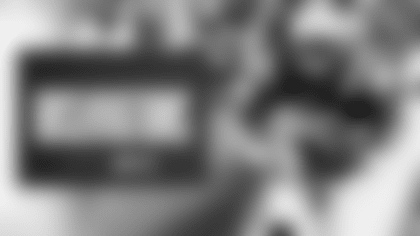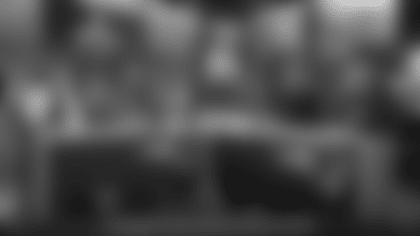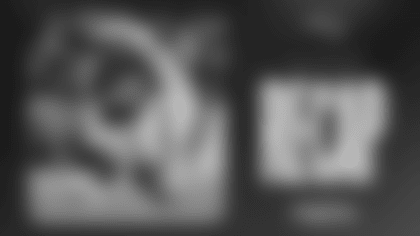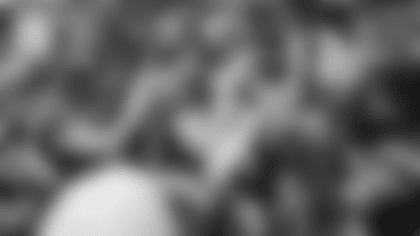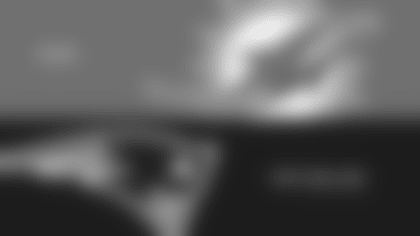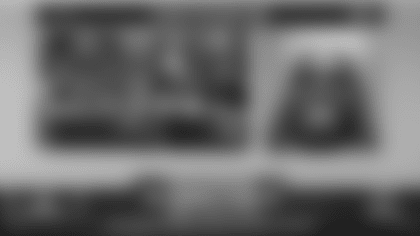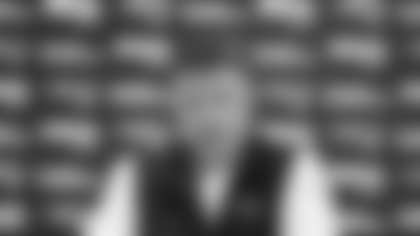BB: We kind of split this week into two parts. We have a little bit of an extra day because of the Friday game. So what we are trying to do these couple of days is clean up some things that we haven't been able to devote quite as much time to because we have been putting in our basic stuff. Some situational plays or using the clock and things like that. Some change ups and plays that we want to use to keep people honest both offensively and defensively and we are going to go up tonight and have kind of a situational practice at the stadium where we can simulate some end of the game conditions and again using time, the clock, and timeouts. Plays that would really come up…very specific plays. Then tomorrow we'll start on our preparations for Carolina and because we have them so early in the season this is almost like a division game where you play a team once and play them a second time. Or similar to what we had last year with Tampa where it was a preseason game and then a regular season game, not quite that close but similar. So we're just making the transition now from training camp to…not that we're in the regular season, but we are close because of the Carolina type preparation. Then next week when we break camp, the last two games Tampa and Washington where it becomes sort of a regular season schedule and a regular season preparation type of schedule. Right now we are starting to go from one to the other. Injury-wise, nothing new there. The guys that are coming back got in a good day of work yesterday and are getting in a little bit more today. So that is encouraging so hopefully we can keep adding to that list. That's my update.
Q: Robert Edwards didn't seem to participate much this morning, has he had some kind of setback or anything?
BB: Well we are taking it slow. We are taking it slow. We don't want to try and throw him in there and have him do everything because he has been out for quite a while. We are trying to measure that one pretty carefully.
Q: Do you think there is any chance at all that he might play against Carolina?
BB: I think there is an outside chance. I'd say less than 50/50. I think there is a chance. I'd say less than 50/50.
Q: Obviously he has to get on the field before that?
BB: Absolutely.
Q: There is a cynical school of thought that he won't be allowed on the field because he will get hurt and then he'll go on injured reserve and that will count against the salary cap?
BB: That is the situation for every player. I mean any player that got hurt and went on injured reserve it would be the same thing.
Q: Do you feel he is whole enough to put on the field?
BB: Well when we do we will put him out there, yes that's the way we felt yesterday that is why he was out there.
Q: Can you talk a little bit about Antowain Smith?
BB: As you know Antowain was an older player coming out of Houston. I think had the same running style and a lot of the same attributes that he showed in the NFL we are talking about today. He is a strong physical runner. He has real good straight-line speed. He is the type of guy that when he gets into the open will out run people. He is not a real shifty Barry Sanders type of a back, but he's strong, he's powerful and he makes most of his yardage with his speed and after the initial contact of guys that can't bring him down. I thought he showed those things against the Giants and we know that is the type of running t style he has and I think it compliments our other backs. There is more than one way to run the ball and to skin a cat, but that's his style and I think that he needs to play within that to be effective.
Q: Some people believe you have to have one featured running back to be successful and others think you can have multiple with different styles like (J.R.) Redmond and (Antowain) Smith. How difficult is it to maintain enough reps for these guys in a game situation that they are both fresh and they are both doing the same thing and they are both in the flow of the game?
BB: I think it is a good point, I think it is a real fair point that you bring up. First of all I would say that there are two ways to do it you can find examples of teams that have one featured back and you can find teams that have it split. Tampa for example with Warrick Dunn and Mike Alstott, you can't get them any different than that. When they run the ball they have a real good running game and it is a tough change of pace for the defense. Eddie George of Tennessee, he is going to be in there every play, he is going to get it every play that they run if he's healthy. So if you have that kind of player, if we had Jim Brown we wouldn't be talking about more than one back or who we are going to give it to, Jim Brown would be carrying it and that would be the end of the story. If Jim Brown emerges, if we have a player that plays like Jim Brown that's what will happen, if we don't then we will manage the situation as we can. When I was here in 1996 when we had Curtis (Martin) he had a lot of carries. The next year Robert (Edwards) came in. He carried the ball a lot in 1998. So if it works out that way it's a good situation, but I also think that if it doesn't than you can still be successful and have a balanced offense, it' just done a little differently.
Q: As evidenced in the game the other night it seems you are trying to get the fullbacks involved in the running game as well, is that what it is going to have to take, is one guy going to have to show you something above and beyond to become the guy who only gets the ball or will it actually be better for you in the long run to have more than one person?
BB: I think having balance at both fullback and halfback is a nice situation if you can create it. Frankly, we didn't think that last year that was something that we could do so we didn't do too much of it, but Marc (Edwards) and Patrick (Pass) are both good ball handlers, they catch the ball well and they both have good running skills so we will try to utilize them to run, to catch and certainly to block. Again some fullbacks in the league are known for their blocking, some for their receiving and some are a combination of blocker, receiver and runner and I think that those two guys are more in that category rather than one outstanding trait and the other ones are pretty far behind. I think that can give your offense some balance. Certainly if one of our backs were to emerge as a guy that we felt like would be the most productive player and needed to carry the ball 25 times a game and he could do that and that was the best thing for us to do I wouldn't hesitate to do it.
Q: How has Kenyatta Jones looked at left tackle?
BB: Kenyatta has done some good things. There are some things that he needs to work on. He had some trouble in the game on a few plays, but overall I thought he did some good things. The thing about Kenyatta is he's physically tough, he finished a lot of blocks. In other words you will see him a number of times in the Giants game blocking right up to the whistle, taking guys out of the play even though he may not be close to the ball. He is still working to finish plays and block to the whistle. A couple of times he had some trouble seeing some quick players on the edge out there, Kenny Holmes he is a pretty good pass rusher, but Kenyatta is getting better each day and if Kenyatta will keep focused and keep working as hard as he can he will be okay. That is really what he needs to do, but what happens to players, and I am not trying to slight anyone, but when a pretty talented player comes out of a relatively small school where he has just been able to dominate the competition because of his physical skills and hasn't been challenged on a week to week basis then sometime it is hard for that player to make that kind of adjustment at the next level where every single play if there is one little mistake it is a problem and they are just not use to facing that. Whereas again, just as an example, if you look at say a defensive lineman last year playing in the Big Ten, the guy is going up against Matt Light, he's going up against … at Minnesota, he's going up against Maurice Williams or Jeff Backus at Michigan, he's going up against the two kids at Michigan State, he's going up against the kid from Wisconsin, so he is getting a pretty good offensive line every single week no matter which guy it is he is playing against. So there is a difference there and it is easier to measure a kid's mentality when he is going up against that kind of competition on a week in and week out basis. So guys that come from smaller schools or from lower levels of competition in college football and make the jump, that is one of the transitions that they have to make, not just the fact that they that they are going against better players, but they are going against better players on an every down basis. Randy Moss playing at Marshall is the same type of thing. You could watch him run by, without being disrespectful, but you could watch him run by corners at Bowling Green, Miami of Ohio, Kent State and the teams that they played, but you have the question how is he going to do when he is lined up against the fasted corners in the NFL? Well it looks like he can run by them too.
Q: Is (Kenyatta) Jones more of a right tackle?
BB: Kenyatta played left tackle in college and based on what we have seen here I think he can play left tackle in the NFL. I think he also probably has the skills to play right tackle, we played him at right tackle in the spring camps. He may be able to play guard, we haven't used him in there. He is a little short for tackle if you look at the average height of tackles in the NFL, he is a little bit short relative to what the averages are, but he doesn't play short and there are other good tackles like Brad Hopkins for example guys like that that are right there at his size. It's not like he is 6'1", but I think he has the flexibility athletically to play any of those spots the question will be technique and recognition. If he plays anywhere other than left tackle than that will be an adjustment for him from a technique and a footwork standpoint.
Q: Not to compare him to (Adrian) Klemm, but is Klemm much farther along in his second year, can you see the drastic difference between year one and year two?
BB: I think Klemm is further along in pass protection. Klemm's footwork and technique are better from that standpoint, yes. Both from college and from having a year, not a full year, I know he was hurt last year, but when he did play and in the offseason and so forth. I think Adrian technique wise and Adrian has seen a lot more. He has seen the blitzes, he's seen the stunts, he's seen NFL defenses a little bit more than Kenyatta has not a lot more, but a little bit more and Kenyatta is learning ever day. Every day that he comes off the field he has seen some things either for the first time or the second time and eventually those reps will add up and I think he will be able to adjust to it.
Q: You used the first preseason game as a little bit of an audition for your kickers and punters. Do you intend to give your non-veterans another shot at this week's game?
BB: Yes I expect to use both kickers and both punters. We went down to two punters only because I don't think we could realistically punt more than two of them in the games So we'll kick Brad (Costello) and Lee (Johnson) and we'll kick Owen (Pochman) and Adam (Vinatieri).
Q: What percentage of the offense roughly will you use in the second week of the preseason and how will that change because you have Carolina coming up in the regular season?
BB: That's a good question and something that we have spent some time on. We had a lengthy meeting on it this morning. We have to decide what we want to do against Carolina and how much we do or don't want to show that now. If you show it then the advantage is that you will get a chance to see how they will adjust to it and of course the disadvantage is they've seen it. If you don't do it than you are saving it, but to some degree you won't know exactly how they are going to line up and play it, exactly what the problems are so if you can find some kind of balance in there. Maybe there is something that you are pretty sure this is how they are going to play and you don't want to show it or maybe there is something else where, 'Gee I wonder what they are going to do when we do this or do that' and maybe you stick it in there and try to take a look at it, but those are the kind of things that we have talked about. Offensively I would say that we are probably about 90 to 95 percent of our offensive stuff is in, we have actually put it and practiced it on the field. There are a couple of things that we still haven't got to yet that will go in the last couple of weeks in the preseason. Whether we use them in the game or not we have installed them, we've practiced them and everybody is responsible for them. We should know how to run them.
Q: How good of a long snapper is Lonnie Paxton, how does he stack up?
BB: Lonnie has improved a lot. I will be honest with you going into last year at the beginning of the year Brad (Seely) and I talked about it and we were a little bit nervous, but as each game went by there were just however many more snaps, five punts, four field goals, another nine or ten snaps every week and [knocks on wood] we are still waiting for a bad one. He is just consistently, whether it be practice, a game situation, he just has strung a lot of them together so the confidence level is a lot higher and he has improved quite a bit. He has improved in his blocking, he's improved in the accuracy of his snapping and the laces on field goals and things like that. He has also worked hard in the weight room and he has changed his body around a little bit. He has redistributed the weight for the better. He is a better player than he was last year.
Q: I mean no disrespect, the previous guy here, Mike Bartrum, was a pretty good blocker and receiver I think he scored a touchdown and Lonnie's sole role is a long snapper. Is that a luxury and am I making light of something that might be very, very critical in the success of the team?
BB: Long snapper is very critical to the football team and the only people who wouldn't emphasize it would be not head coaches and not special teams coaches. I have been on staffs and I have seen it before where an offensive or defensive coach will say, 'Oh yes so and so can snap, let's keep an extra guy we don't need a long snapper', but if you have coaches special teams or if you've been a head coach there is no quicker way to lose a game than a bad snap and once you have had one they seem to come in droves. On the other side of the ball if you see a snapper is having trouble than you know to go after him. I know when I was a special teams coach the first thing I looked for in terms of blocking punts was not the punter, but the snapper. It's not 'well this guy is a slow punter' yes you might take that into consideration, but if the snapper was below average that's the guy you really want to go after. Make him block, wait for a bad snap, even if your rush isn't perfect the fact that the punter has extra time to handle the ball and so forth that I always felt that that was a perfect opportunity to go after him. I can't overstate the importance of a punter. As a high school player, having put a couple over the punter's head, I have been in that boat myself too.
Q: So you have respect for someone who can do that?
BB: I do, I do.
Q: I think there may be a lot of layman who look at that and think that this guy's only job is to long snap?
BB: Scott Pioli and I have talked about this quite a bit that about two-thirds of the league have just pure long snapper, that's it. Even Mike Bartrum and Mike was here when I was here, he played tight end very minimally though, so maybe he was just slightly more than that, but for the most part finding long snappers that do anything more than that is pretty uncommon. When I was with the Giants we had Steve DeOssie and Steve was a backup linebacker and he played situationally on the goal line and that kind of thing. We were pretty fortunate we had Harry and we had Pepper (Johnson) and it was pretty tough to crack that lineup, but Steve played in Dallas, but that is more the exception than the rule because what happens is no matter what position the guy plays if he gets hurt then you are dead. I feel pretty good about our situation. When we get to the season and if (Mike) Compton is back or whatever point he is back whether it is next week or next month, forget about the timing of it, but just conceptually Lonnie's backup is a guy that has snapped in the league and is a good snapper. We had the same situation in Cleveland where Brian Kitchen was our snapper and Everett was his backup so if we had to snap the other guy you felt like you could still stay in the game and get the punt off or the field goal.
Q: Speaking of snapping, would you ever be in a situation where you'd feel since Compton was a center that you would have to move him over in a shotgun formation because Damien (Woody) still seems to be having problems with that snap?
BB: He sure does, I wouldn't rule that out at all. There is nothing more important than the quarterback center exchange, the shotgun snap or the punt snap on placement or for punt kicks. The team is tired of hearing me say it I am sure, but I keep harping it and keep preaching it and I am sure you will notice out there any time there is a bad snap there are guys running around the field and while they are running around the field hopefully they are thinking about not having another bad snap. It is a junior high school play. I don't care what level of football you are playing at it starts with the quarterback center exchange or whoever the center is giving the ball to whether it is the punter, the quarterback or whoever, whether he is under center, in a shotgun, punt formation or whatever and without that fundamental play you cannot do anything at any level high school, pee wee, junior high, NFL, so to not get that right you have no chance to run a play. Yes it is definitely an issue that… without that we don't have anything so if that is what we have to do we will do it.
Q: With it Woody is it mental, is it technique?
BB: Whatever it is if the quarterback can't handle them it is a problem. It doesn't really matter what it is to tell you the truth, it doesn't really matter. We have worked on it, we work on it a lot, but in the end anything like that, it's like a two foot putt. A guy misses a two-foot putt, why did he miss it? Was it his back swing, did he not play the break, did he hit it too hard, did he hit it too soft? In the end really it's concentration, it's concentration. It is not that hard of a play. I don't know how many college games I watched last year, but it was a lot, we see them every Saturday. The colleges are in shotgun and they have plenty of guys that can snap it. This is the NFL we should be able to make that play too, it is not that hard of play.
Q: Would you just move him over for shotgun, or would you consider…?
BB: We will do whatever we have to do, but if we can' get the ball back to the quarterback it doesn't make any difference. I mean you could take a Hall of Fame team out there and they are not going to do anything. If the quarterback doesn't have the ball it doesn't make any difference who else is out there.
Q: When you say move him over would you flip them?
BB: I don't know. We will do whatever we have to do, but we have to get the ball to the quarterback, everything starts there, that's number one.
Q: Do you have any updates on (Andy) Katzenmoyer?
BB: No, I have no updates.
Q: Can you talk about Marc Edwards?
BB: Marc is having a good camp. Marc didn't really get a chance to handle the ball much in Cleveland. When he was in San Francisco, he was drafted by the 49ers, he was out there for two years and in that offense that they ran in Dan Francisco March handled the ball quite a bit. He caught passes, he ran some sweeps, ran the ball inside, played on special teams in the kicking game and you could see him doing a lot of different things. When he went to Cleveland last year, probably the game he got the ball the most in was our game. He caught a couple of passes out in the flat, but overall he didn't get to carry it and his receiving opportunities were limited so when we looked at the fullbacks in the offseason and specifically Marc one of the things that we did was go back to the 49ers films from whatever year that would have been '97 or'98 and saw his skills there and felt like he still possessed them, but they just didn't call on him much to do that in Cleveland. Again, he has good all-around skills and we have been trying to give him an opportunity daily to catch the ball, to run with the ball and keep those sharp. Marc is a tough guy, he is dependable and he really had a good offseason for us and I think that has carried over into training camp. I would like to see him run the ball a few times every game and help keep the defense honest because he is a big back and he runs with some power.
Q: When is the next round of cuts?
BB: The first mandatory cut is the 60 cut and that would be after the Tampa game and then the 53 cut is the Saturday or Sunday before Cincinnati. So there are no mandatory cuts until then.




